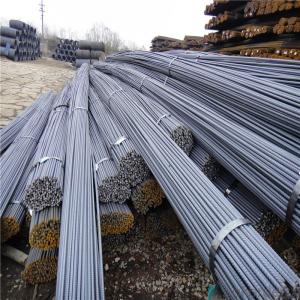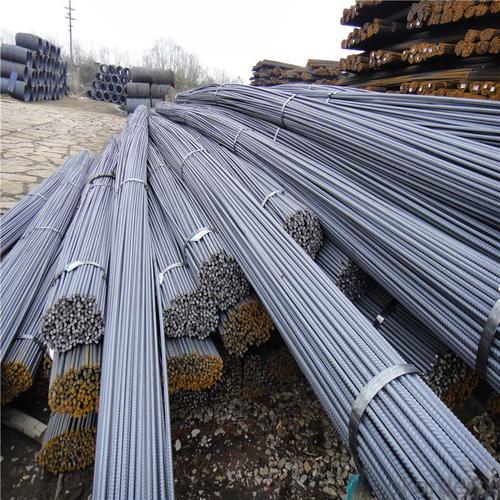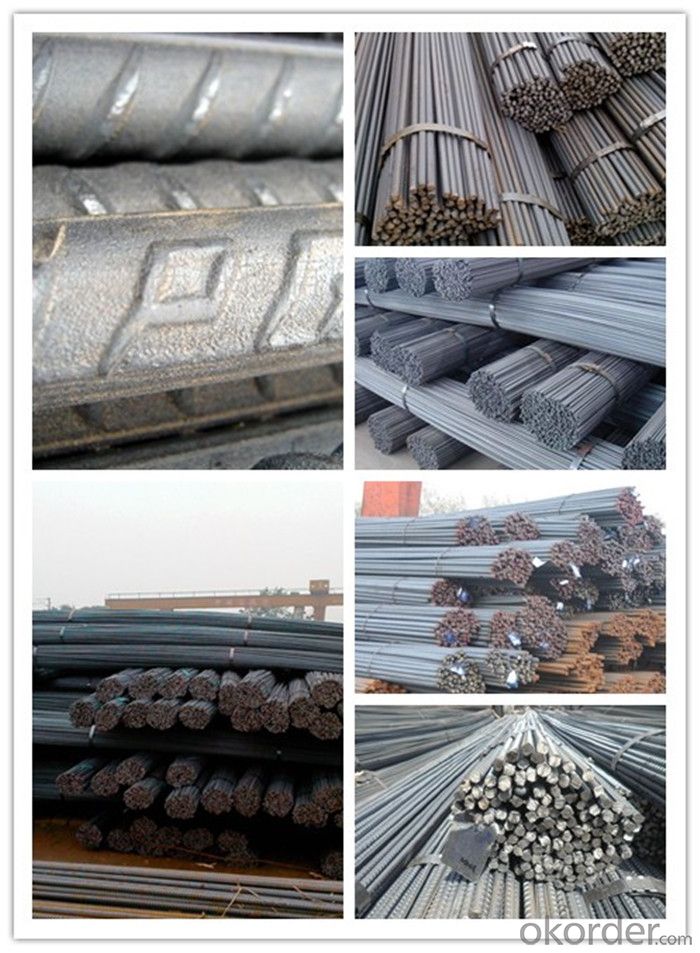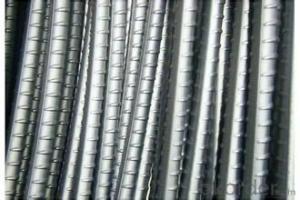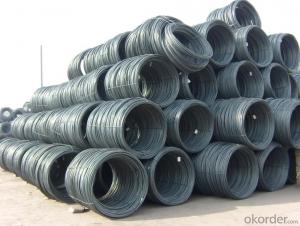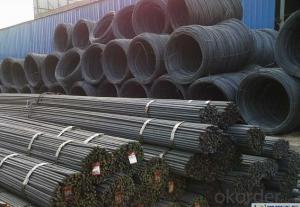High Tensile Deformed Steel Bar
- Loading Port:
- Tianjin
- Payment Terms:
- TT OR LC
- Min Order Qty:
- 100 m.t.
- Supply Capability:
- 50000 m.t./month
OKorder Service Pledge
OKorder Financial Service
You Might Also Like
Specification
High Tensile Deformed Steel Bar
Description of High Tensile Deformed Steel Bar:
1, Diameter: 5.5mm-10mm rounds reinforcing steel bar
10m- 40 rods reinforcing High Tensile Deformed Steel Bar
2, Length: 6m, 9m, 12m or customized
3, Standard: GB, ASTM, AISI, SAE, DIN, JIS, EN
OEM technology - send detailed technical parameters for accurate quotation.
2, Produce Process: smelt iron - EAF smelt billet - ESR smelt billet -
hot rolled or forged to get the steel round bar and plate
3, Heat Treatment: annealing, normalizing, tempering, quenching
4, Surface Treatment: Black
5, Quality Assurance: We accept third party inspection for all orders.
You can ask testing organizations such as SGS, BV, etc. to test our products before shipping.
Chemical Composition of High Tensile Deformed Steel Bar:
Grade | Technical data of the original chemical composition(%) | |||||
Reinforcing steel bar HRB335 | C | Mn | Si | S | P | B |
≤0.25 | ≤1.60 | ≤0.80 | ≤0.045 | ≤0.045 | >0.0008 | |
Physics Capability | ||||||
Yield Strength(N/cm2) | Tensile Strength(N/cm2) | Elongation(%) | ||||
≥ 335 | ≥490 | ≥16 | ||||
Reinforcing steel bar HRB400 | C | Mn | Si | S | P | B |
≤0.25 | ≤0.16 | ≤0.80 | ≤0.045 | ≤0.045 | 0.04-0.12 | |
Physics Capability | ||||||
Yield Strength(N/cm2) | Tensile Strength(N/cm2) | Elongation(%) | ||||
≥ 400 | ≥ 570 | ≥ 14 | ||||
Product Show of High Tensile Deformed Steel Bar:
Company Information:
CNBM International Corporation is the most important trading platform of CNBM group.
Whith its advantages, CNBM International are mainly concentrate on Cement, Glass, Iron and Steel, Ceramics industries and devotes herself for supplying high qulity series of refractories as well as technical consultancies and logistics solutions.

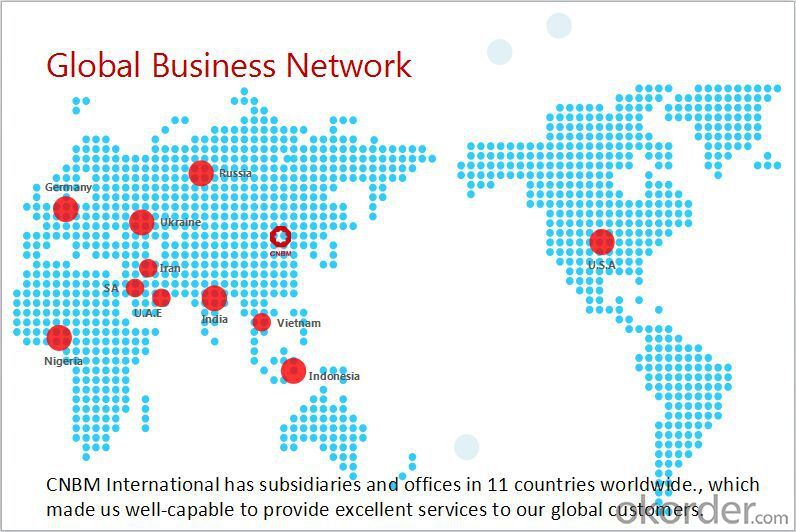
FAQ:
1, Your advantages?
professional products inquiry, products knowledge train (for agents), smooth goods delivery, excellent customer solution proposale
2, Test & Certificate?
SGS test is available, customer inspection before shipping is welcome, third party inspection is no problem
3, Factory or Trading Company?
CNBM is a trading company but we have so many protocol factories and CNBM works as a trading department of these factories. Also CNBM is the holding company of many factories.
4, Payment Terms?
30% TT as deposit and 70% before delivery.
Irrevocable L/C at sight.
5, Trading Terms?
EXW, FOB, CIF, FFR, CNF
6, After-sale Service?
CNBM provides the services and support you need for every step of our cooperation. We're the business partner you can trust.
For any problem, please kindly contact us at any your convenient time.
We'll reply you in our first priority within 24 hours.
- Q: What grade of iron powder should be used for processing special steel? Are there any other elements on the request? How much are they?
- The main special steel carbon structural steel, carbon tool steel, carbon spring steel, alloy spring steel, alloy structural steel, bearing steel, alloy tool steel, alloy tool steel, high-speed tool steel, stainless steel, heat-resistant steel and high-temperature alloy, precision alloy, gold and other electric heating.
- Q: What are the environmental impacts of producing special steel?
- The production of special steel has several environmental impacts. Firstly, the extraction of raw materials such as iron ore and coal leads to habitat destruction and loss of biodiversity. Secondly, the manufacturing process involves high energy consumption, contributing to greenhouse gas emissions and climate change. Additionally, the use of various chemicals and additives in steel production can result in water and soil pollution. Lastly, the disposal of waste materials, including slag and dust, can have detrimental effects on local ecosystems if not properly managed.
- Q: What are the unique properties of stainless steel?
- Stainless steel has several unique properties that make it highly desirable in various applications. Firstly, it has excellent corrosion resistance, making it resistant to rust and staining, even in harsh environments. Additionally, stainless steel is durable and can withstand high temperatures, making it suitable for use in extreme conditions. It also has a high strength-to-weight ratio, making it strong yet lightweight. Moreover, stainless steel is hygienic and easy to clean, making it ideal for use in food processing and medical equipment. Lastly, stainless steel has an attractive appearance and can be easily fabricated into different shapes, making it a versatile material for various industries.
- Q: What are the different galvanizing techniques used for special steel?
- There are several galvanizing techniques used for special steel, each with its own advantages and considerations. Some common techniques include hot-dip galvanizing, electro-galvanizing, and mechanical galvanizing. Hot-dip galvanizing involves immersing the steel in a bath of molten zinc, creating a thick, durable coating. Electro-galvanizing uses an electric current to deposit a thin layer of zinc onto the steel surface. Mechanical galvanizing, also known as centrifuge galvanizing, uses centrifugal force to apply a zinc coating. Each technique has its own specific applications and benefits, depending on factors such as the desired thickness of the coating, the complexity of the steel structure, and the intended use of the galvanized steel.
- Q: How is duplex stainless steel used in the oil and gas industry?
- Duplex stainless steel is commonly used in the oil and gas industry due to its unique combination of strength, corrosion resistance, and cost-effectiveness. It is utilized in various applications such as pipelines, offshore platforms, and equipment for drilling, extraction, and refining processes. Its resistance to corrosion and high mechanical strength make it suitable for withstanding harsh operating conditions, including exposure to corrosive drilling fluids and high-pressure environments. Overall, duplex stainless steel plays a crucial role in ensuring the integrity and reliability of oil and gas operations.
- Q: How does special steel perform in surface hardening applications?
- Special steel is known for its excellent performance in surface hardening applications. Surface hardening is a process used to increase the hardness and wear resistance of the outer layer of a metal component, while maintaining a tough and ductile core. Special steel, also known as alloy steel, is specifically designed to possess certain desirable properties, such as high strength, toughness, and resistance to corrosion and heat. When it comes to surface hardening, special steel exhibits superior characteristics compared to regular steel. Its alloying elements, such as chromium, molybdenum, and vanadium, enhance its hardenability, allowing for effective heat treatment processes like carburizing, nitriding, or induction hardening. These processes modify the surface microstructure of the steel, resulting in increased hardness and wear resistance. Special steel's ability to be hardened to a greater depth than regular steel makes it ideal for surface hardening applications. The hardened layer formed on the surface provides protection against abrasion, erosion, and fatigue, thus significantly extending the lifespan of the component. Additionally, the improved wear resistance and hardness of special steel make it suitable for applications in industries such as automotive, aerospace, and manufacturing, where components are subjected to extreme conditions and high levels of stress. Furthermore, special steel's exceptional mechanical properties make it highly durable even after surface hardening. It retains its toughness and strength, ensuring that the component can withstand heavy loads and impacts without failure. This combination of hardness and toughness is crucial for applications where both wear resistance and structural integrity are essential. In conclusion, special steel is highly effective in surface hardening applications due to its superior hardenability, wear resistance, and mechanical properties. Its ability to withstand extreme conditions and maintain its durability makes it a preferred choice for industries that require components with enhanced surface hardness and longevity.
- Q: What is the significance of vanadium in special steel?
- Vanadium is a significant element in special steel due to its unique properties and effects on the steel's performance. Special steel refers to high-quality, high-performance steel that is designed for specific applications where strength, durability, and other specific characteristics are required. One of the main reasons vanadium is used in special steel is its ability to increase the strength and toughness of the steel. Vanadium forms very strong carbides within the steel's microstructure, which help to prevent grain growth and improve the steel's resistance to deformation and cracking. This makes the steel highly suitable for applications that require excellent strength, such as in the construction of bridges, high-rise buildings, and machinery. In addition to strength, vanadium also enhances the hardenability of the steel. Hardenability is the ability of the steel to be hardened through heat treatment processes, such as quenching and tempering. Vanadium increases the hardenability of the steel, allowing it to be easily hardened to achieve the desired properties, such as increased wear resistance and improved cutting performance. This makes vanadium-containing special steel ideal for tools, dies, and other applications that require hardness and wear resistance. Furthermore, vanadium contributes to the steel's corrosion resistance. It forms stable oxide layers on the surface of the steel, which act as a protective barrier against corrosion and oxidation. This is particularly beneficial in environments where the steel is exposed to harsh conditions, such as marine environments or chemical processing plants. Moreover, vanadium also improves the heat resistance and thermal stability of special steel. It helps to retain the steel's strength and hardness at elevated temperatures, making it suitable for applications that involve high-temperature environments, such as aerospace components and automotive engine parts. Overall, the significance of vanadium in special steel lies in its ability to enhance the steel's strength, toughness, hardenability, corrosion resistance, and heat resistance. These properties make vanadium-containing special steel highly sought after in various industries where exceptional performance and reliability are required.
- Q: What are the different methods for controlling the grain size in special steel?
- There are several methods for controlling the grain size in special steel. One common method is through the use of alloying elements such as vanadium or niobium, which can help refine the grain structure. Another approach is to employ controlled cooling techniques, such as quenching or tempering, to manipulate the rate at which the steel solidifies and thus control the grain size. Additionally, grain size can be influenced by the addition of grain refiners or by subjecting the steel to severe plastic deformation processes like rolling or forging. Overall, these methods allow for precise control over the grain size in special steel, enabling improved mechanical properties and performance.
- Q: Can special steel be used in the agricultural sector?
- Yes, special steel can be used in the agricultural sector. Special steel, such as high-strength steel or corrosion-resistant steel, can be utilized in various applications within agriculture, including the manufacturing of farm equipment, machinery, tools, and infrastructure. These steel types offer enhanced durability, strength, and resistance to harsh environmental conditions, making them suitable for agricultural operations and ensuring long-lasting and efficient performance in the field.
- Q: What are the different methods of improving the machinability of special steel?
- There are several methods that can be employed to improve the machinability of special steel. These methods include: 1. Alloying: By introducing certain alloying elements, such as sulfur, selenium, lead, or bismuth, into the steel composition, the machinability can be enhanced. These elements act as lubricants during machining, reducing friction and cutting forces. 2. Heat treatment: Heat treatment processes like annealing, normalizing, or stress relieving can help improve the machinability of special steel. These processes refine the microstructure, reduce hardness, and increase ductility, making the material easier to machine. 3. Microstructural modifications: Modifying the microstructure of special steel through processes like grain refinement or controlled precipitation of carbides can enhance machinability. Fine-grained steels are generally easier to machine due to reduced cutting forces. 4. Surface coatings: Applying specialized coatings, such as titanium nitride (TiN) or diamond-like carbon (DLC), on the surface of special steel can reduce friction, improve tool life, and enhance chip flow during machining. 5. Tool selection and optimization: Choosing appropriate cutting tools with specific geometries, coatings, and cutting parameters can significantly improve machinability. Optimal tool selection ensures efficient chip evacuation, reduces heat generation, and minimizes tool wear. 6. Machining parameters optimization: Adjusting machining parameters like cutting speed, feed rate, and depth of cut can have a significant impact on machinability. Fine-tuning these parameters can help reduce tool wear, control chip formation, and achieve better surface finish. 7. Lubrication and cooling: Proper lubrication and cooling methods, such as using cutting fluids or coolants, can enhance machinability by reducing friction and heat generation during machining. This helps prolong tool life and minimize workpiece deformation. It is important to note that the specific method or combination of methods used to improve machinability will depend on the type of special steel and the desired machining outcome.
Send your message to us
High Tensile Deformed Steel Bar
- Loading Port:
- Tianjin
- Payment Terms:
- TT OR LC
- Min Order Qty:
- 100 m.t.
- Supply Capability:
- 50000 m.t./month
OKorder Service Pledge
OKorder Financial Service
Similar products
Hot products
Hot Searches
Related keywords
